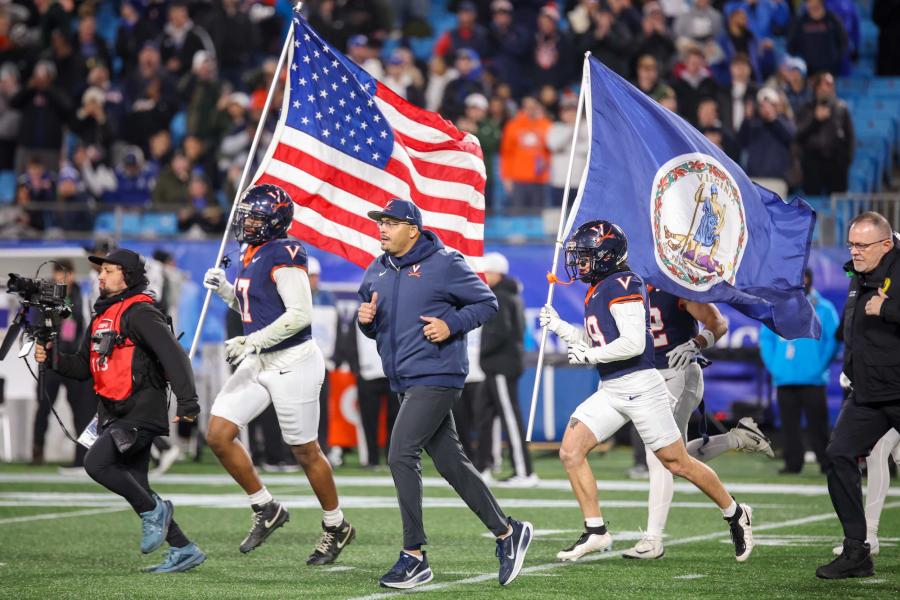The outstanding professors range from an assistant professor who created a card game that students play in biology classrooms around the world, to an associate professor who gives his students an assignment to write a “fabulous, funky or fresh” report analyzing issues, to an education professor who teaches a class speaking only Romanian, to let her teaching students know what it feels like for someone learning a new language.
UVA Awards Outstanding Teachers, Citing Empathy, Technology and Collaboration

2022 Teaching Award Honorees
Alumni Association Distinguished Professor
Andrea Alston Roberts, associate professor of commerce, McIntire School of Commerce
Alumni Board of Trustees Teaching Award
Amanda Gibson, assistant professor of biology, Arts & Sciences
All-University Teaching Awards
- Shannon Barker, assistant professor of biomedical engineering, School of Engineering and Applied Science
- Nada Basit, assistant professor of computer science, School of Engineering and Applied Science, with courtesy appointment in School of Data Science
- Rose Buckelew, assistant professor of sociology, Arts & Sciences
- André Cavalcante, associate professor of media studies and of women, gender & sexuality, Arts & Sciences
- Sarah Craig, assistant professor of nursing, School of Nursing
- Rachel Harmon, Harrison Robertson Professor of Law and Class of 1957 Research Professor of Law, School of Law
- Nitya Kallivayalil, associate professor of astronomy, Arts & Sciences
- Marc L. Lipson, Robert F. Vandell Professor of Business Administration, Darden School of Business
- April Salerno, assistant professor of curriculum, instruction and special education, School of Education and Human Development
This cohort of esteemed teachers, whose awards are administered by the UVA Provost’s Office, was honored at a reception this week. (Public service award winners, also honored this week, will be featured in a separate UVA Today article.)
The instructors created exciting learning environments that helped their students not only think like a nurse, astrophysicist, evolutionary biologist, criminal lawyer, financial manager, or public intellectual, but also act like one in academic and other professional settings.
Several students mentioned that the teachers so inspired them, they decided to pursue the same or similar professions.
Among the many superlatives found in the awards nomination letters from students, fellow instructors, deans and other UVA community members, several themes recurred: how professors stressed empathy and ethics, showcased big data and advanced technology, and engaged learners, including with opportunities to collaborate.
“I tell people that being a professor is the best job in the world,” wrote Andrea Alston Roberts, associate professor of commerce, and she still feels that way “after 20 plus years of teaching, all the changes in academe, and a global pandemic.”
One of her reasons is having a positive impact on a young person’s life. “I am fully aware that this opportunity comes with great responsibility, and my teaching philosophy centers around that. Whenever I engage with a student, I consider myself a teacher, whether that engagement is in the classroom, during office hours, a mentor meeting, traveling abroad, or sharing a meal. My teaching philosophy is to create spaces where my students and I are learning partners, and we can learn and grow.”
In turn, students trust her whether they are graduate students or students from the Posse Foundation, for which she was a faculty mentor. The Posse Foundation program provides scholarships to a group of disadvantaged students and provides resources for all four years.
Roberts’ accounting courses attract a range of students from majors in the Commerce School to non-business students. Dean Nicole Thorne Jenkins and associate professor of accounting Adam Koch, who nominated her, said she is approachable and adapts to different learning strengths. For example, she gives untimed exams that emphasize learning the material rather than speed.
When the pandemic forced online and hybrid instruction, “she was at the forefront of our school in experimenting with online options” and increased her office hours to be more available, her nominators said, inspiring her colleagues to do the same.
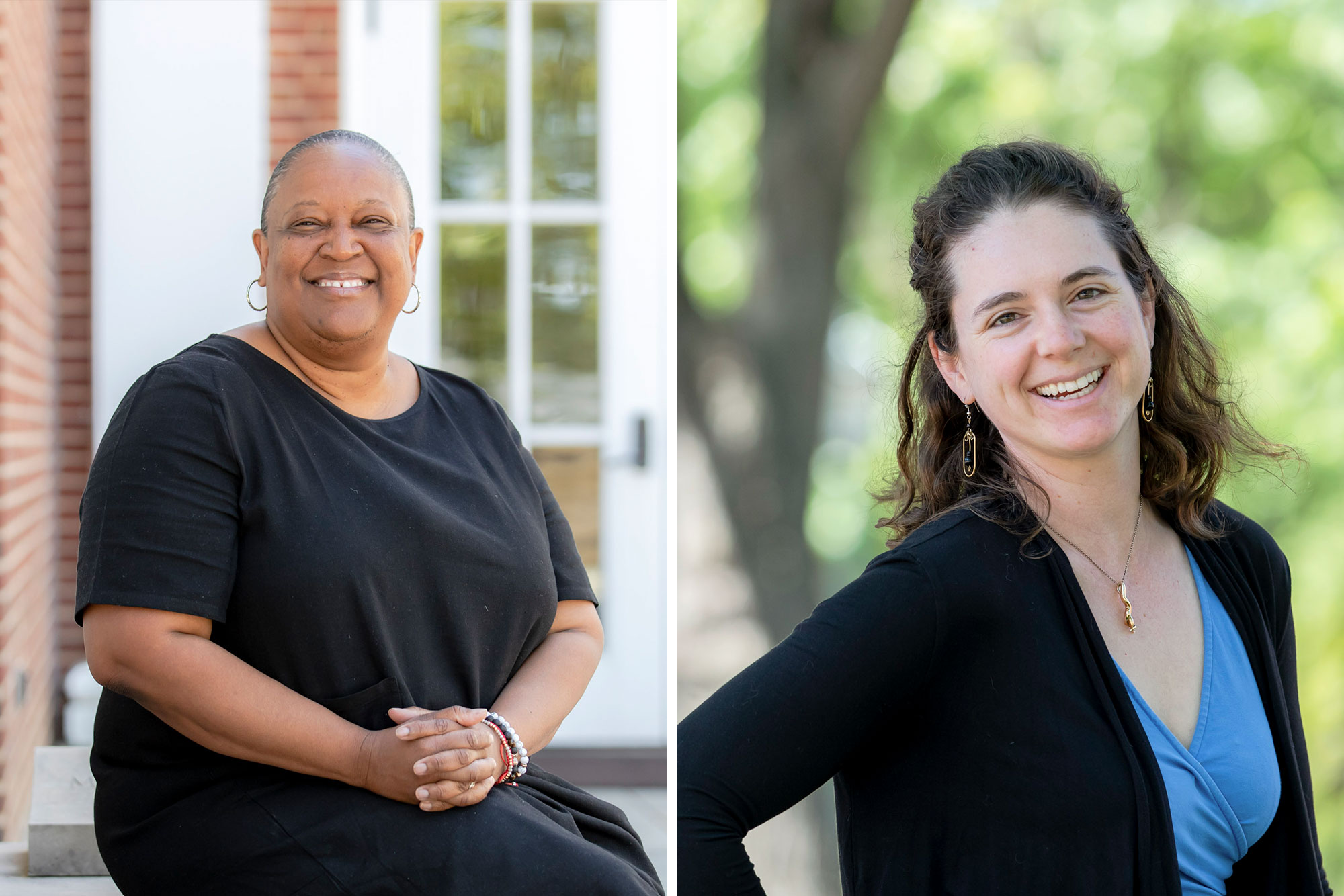
Amanda Gibson’s card game to teach the “Red Queen hypothesis” of evolutionary biology has a related video online, enabling students nationally and internationally to play. The game, which she and two doctoral colleagues published a paper about, received the 2016 Thomas Henry Huxley Award from the Society for the Study of Evolution for achievement in education and outreach.
When it was clear that surging levels of COVID might impact in-person classes, the College of Arts & Sciences offered online summer classes to the entering class of 2020 to help them adjust. Gibson, an assistant professor of biology, volunteered to teach the biology course Spillover: Where, When and Why do Pathogens Jump to New Hosts? And, What Happens Next? The course was very well received, noted her nominator, Deborah Roach, who chairs the Biology Department.
Gibson’s students said she humanizes science.
One student said, “Gibson diverges from the typical science-lecture format and instead of a textbook, students read primary research papers, and they develop skills through role-playing exercises, card games or equations. She wants students to move beyond just learning information and instead to learn how to craft testable hypotheses and design experiments to test those hypotheses. She invites some of the scientists who wrote the papers they have read to visit her class by Zoom.”
Shannon Barker, assistant professor of biomedical engineering, has specifically created a curriculum to promote empathy in engineering in a humanitarian setting for her first-year engineers. She included a project to redesign a Rohingya refugee camp. One of her teaching assistants said Barker often emphasized instilling social awareness and empathy in her courses.
“This was refreshing to see, as I had not been exposed to many opportunities for humanitarian research within my engineering studies,” the teaching assistant wrote.
In her teaching statement, Barker said, “Traditionally, engineering culture has emphasized the technical for greater efficiency and productivity. However, today’s engineer not only has to be technically proficient, but must also consider the ethical and social responsibilities of developing and implementing increasingly complex systems; and they must learn to live and work as global citizens.”
Barker uses the example of medical devices, used by millions of people for prevention, diagnosis, treatment and management of illness. “Design-related failures are the leading cause of medical device errors and hazards; and these failures are often due to poor design that does not take into account the user or the user’s environment and circumstances,” she wrote.
Nada Basit, assistant professor of computer science, is the first and only faculty member in computer science who regularly teaches students in the School of Engineering and Applied Science, the College of Arts & Sciences and the School of Data Science. She has developed and teaches a curriculum for the Computer Science Department, and has also done so for the Master of Science program of the School of Data Science. Basit teaches several courses at UVA, from introductory programming to machine learning and database systems, from seminars of 10 students to large classes of 500 undergraduates.
One professor who has team-taught with her said Basit “always provided informative resources to allow her students to gain a better understanding of the material. She prepares information that is practical and utilizes online resources and videos to provide insights into the application of the course concepts.”
Students commented, “All of the material is applicable to real projects” and “the course is useful in real life.”
In her reflective teaching statement, Basit wrote that databases are a passion of hers.
“I strive to teach topics as interactively as possible,” she said. “This led me to design and create with the assistance of several independent study students an educational learning tool that gives students the ability to learn about SQL injection attacks [a form of malicious hacking], access control, and a way to mitigate such attacks.”
Her learning tool engages students and allows them to experiment in a safe and controlled environment. Her goal is to share this tool with others at UVA and other institutions.
The colleague who nominated Rose Buckelew, assistant professor of sociology, wrote, “The work that Buckelew does to advance equity and build relationships in her classrooms that allow students to openly engage in difficult discussions across their personal differences enables her to do another type of work that truly distinguishes her from her peers. She builds mentorship relationships with many marginalized students that enable her to help them navigate their education on a regular basis but also in moments of extreme need.”
Along with seminars, Buckelew instructs large undergraduate courses on race, ethnicity and crime in two courses – Introduction to Sociology, and Criminology – and uses a variety of methods to engage students in smaller groups. Students in evaluations said she was the best professor they have had and helped smoothly transition classes online, showing compassion for what everyone was going through.
One student wrote in a class evaluation, “She pushed our class as a whole, but further allowed us to learn from one another. She provided a space for peer-to-peer processing, and is a skilled and talented shepherd of discussion. While the material Professor Buckelew specializes in is extremely sensitive, she navigated controversial waters sensitively and simultaneously without fear.”
As for her teaching style, a colleague wrote, “I had the chance to see firsthand her poise and comfort as a lecturer, her skill at facilitating discussion of politically and emotionally charged issues, her strong rapport with students across the demographic spectrum, and her ability to be at once intellectually challenging and caring.”
In 2020, the Center for Teaching Excellence, impressed by her teaching, facilitation and leadership skills, actively recruited her to support University-wide programming, and since then, she has cofacilitated 18 workshops for 300 participants on topics ranging from “Responding to Microaggressions and Conflict in the Classroom” to “Designing Inclusive Classroom Infrastructure.”
In addition, Buckelew has conducted similar workshops for other UVA communities, including UVA’s College at Wise.
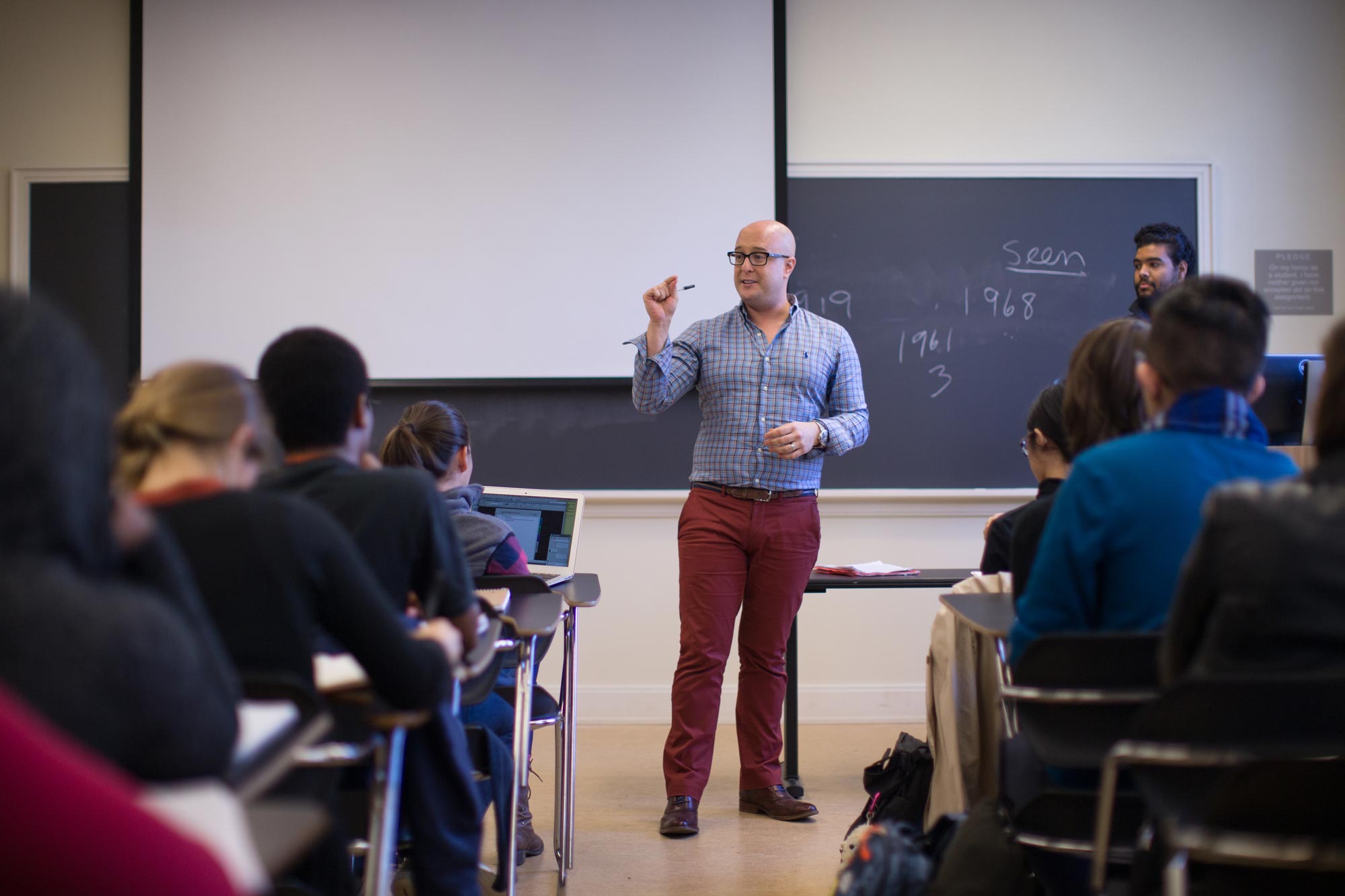
André Cavalcante also brings these values into play in his courses in queer theory for the departments of Media Studies and of Women, Gender & Sexuality. The associate professor wrote in his teaching statement, “My pedagogy seeks to inspire students, to fill them with a sense of wonder by showing them that media and LGBTQ issues are filled with unanswered questions and densely knotted complications, that we are still living and writing the history of these ideas, and that students have the power to influence the future.”
One former student noted, “Professor Cavalcante gave me one of the most powerful tools a professor can: knowledge of and a connection to the history of one’s community.”
Cavalcante also encourages his students to participate in the latest scholarship by bringing in academic and media articles. He gives students opportunities to become media producers themselves, with several assignments to create podcasts and memes.
Cavalcante’s nominators wrote that he asks students to do a “fabulous, funky and fresh” report, in which students identify anything they liked (i.e., “fabulous”), disliked (“funky”), or found striking or new (“fresh”).
“This type of assignment also demonstrates Cavalcante’s innovative approach to teaching – an approach that requires students to keep up with the reading and to grapple deeply with the classroom material, beyond strict memorization,” wrote nominators Doug Meyer and Matthew Chin.
Nursing is a field that naturally lends itself to empathy. Sarah Craig’s experience as a first-generation college student taught her to find ways to support students’ success, part of which is “creating a safe learning environment where students feel valued,” she wrote.
Craig, assistant professor of nursing – and no stranger to technology, being the first to bring simulation into her classroom at the Nursing School – made some adjustments to online teaching. To counteract “the digital loneliness imposed on us” by the pandemic, Craig began each class with, “Here at the UVA School of Nursing we believe that everyone participating in activities is intelligent, capable, cares about doing their best and wants to improve.”
She found, “It is a small statement with a big impact. I focused on role modeling this statement in class and on clinical rounds. Providing structure, motivation, and respect for all encouraged the cohort to support each other’s success during this difficult time.”
Early in the pandemic, Craig and others realized nursing students could not be exposed to COVID in the hospital. She was instrumental in helping prepare students for when they could return to providing patient care, for example, on how to use full personal protective equipment.
“Almost overnight,” wrote her nominator, Beth Epstein, associate professor and associate dean for academic programs, “she drafted a comprehensive teaching plan, including thorough simulations and videos. She was a key player in orchestrating and executing the enormous task of readying our students in a very short period of time.”
Several years ago, Craig recognized the importance of immersive learning for student competence and led the integration of the simulation-based learning in the School of Nursing. She designed “innovative simulation experiences for our students across multiple programs” and spearheaded the creation of a Clinical Skills Intensive lab in the Clinical Simulation Learning Center.
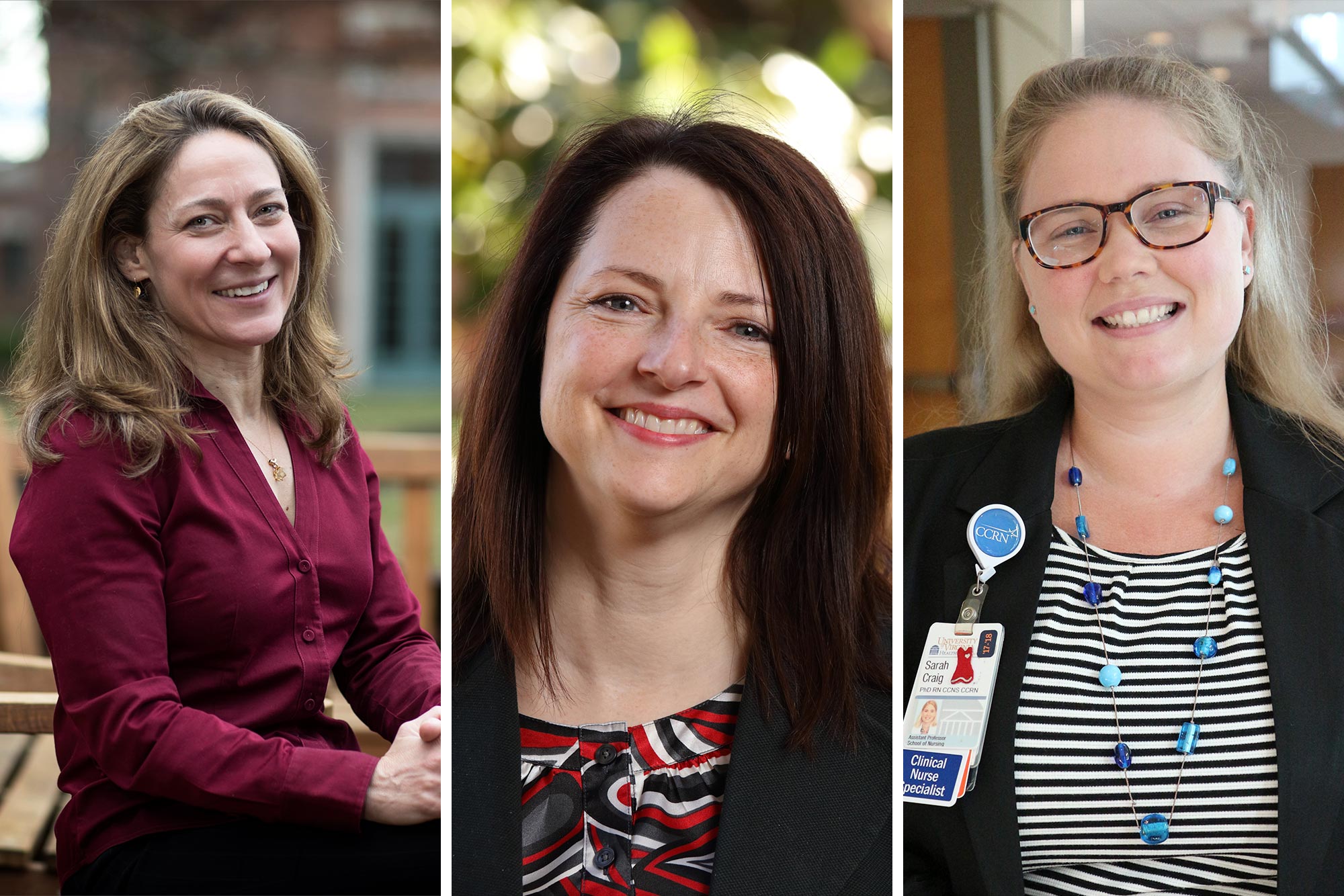
Rachel Harmon, who serves as the Harrison Robertson Professor of Law and Class of 1957 Research Professor of Law and director of the Center for Criminal Justice, literally wrote the book on “The Law of the Police.”
As Law School Dean Risa Goluboff wrote, “These are difficult and controversial subjects. The cases are ripped from the headlines, and they involve deeply troubling facts about violence, racism and discrimination. Students from across the ideological spectrum flock to her courses and gush about her thoughtful and evenhanded approach. She encourages everyone to speak up, even when the topic is thorny. The result is miraculous: a large group of diverse students having a civil discussion about some of the most salient and controversial issues in American life.”
Harmon teaches Criminal Law, Criminal Procedure and The Law of the Police, the latter a new field that encompasses familiar aspects of constitutional law and the disparate mechanisms that empower, restrict and influence police departments and officers.
She wrote in her teaching statement, “My overarching goal is not merely to train students to be lawyers; it is to empower them to use law to influence social conditions and institutions. Or as I tell my students, I am preparing them to run the world, and to change it.”
Associate professor of astronomy Nitya Kallivayalil’s nominator wrote that she “does not place her roles of teaching, mentoring, and efforts towards diversity and equity in different silos.” She has developed a long-term collaboration with Spelman College’s Physics Department, enabled by an NSF/CAREER grant, with the goal of encouraging future STEM leaders from under-represented groups. Spelman students have come to UVA for each of the past five summers to do research with Kallivayalil.
Kallivayalil has students generate their own mini-research proposals. “My teaching philosophy has focused on two major factors affecting modern day society: the fact that our world is increasingly run by large amounts of amassed data, i.e., databases; and the lack of diversity in science, technology and math (STEM) fields.”
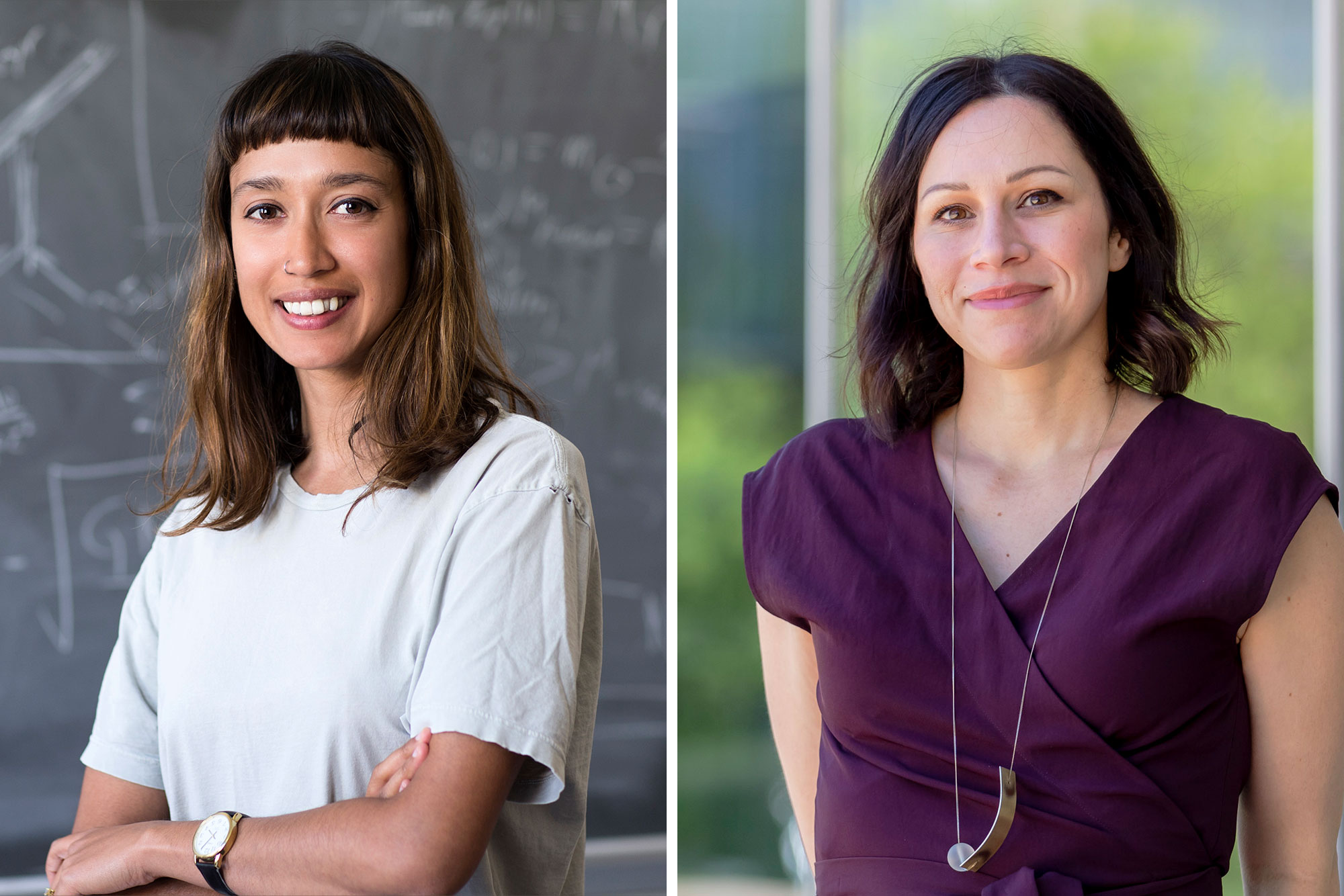
Nominating Kallivayalil, Phil Arras, VITA professor and astronomy department chair, wrote, “A revolution is currently taking place in astronomy, in which the old practice of individual astronomers traveling to use telescopes for a handful of nights a year is being replaced by teams of astronomers carrying out surveys of vast numbers of objects in the night sky. The output of these large surveys is then available for everyone to download and use. Nitya’s key contribution has been to design a course to modernize our curriculum and train students in database manipulation skills and data analysis in order to use the surveys to address scientific questions.”
Many student evaluations said she was hands down the best teacher they had had at UVA, and Arras wrote that her new course in Research Methods in Astrophysics has been a hit, garnering “stellar” course evaluations and comments such as, “This is one of the most helpful classes. Not only did it teach actual real-world skills, but it gave a look at how real astronomers/scientists approach and solve issues. We had to work with actual data and learn all of the steps in order to get an actual tangible solution.”
Marc L. Lipson has been leading the Darden School in what he calls “student-centered learning” since shortly after arriving in 2005. His supporters said he has the “ability to get students to engage with difficult problems, experiment with solutions, and in the process understand markets and organizations.”
Lipson also developed “Darden Before Darden,” a pre-matriculation program that supports students from diverse backgrounds to acquaint them with the school and Darden’s methods. Dean Scott Beardsley, who nominated Lipson, said he accommodates everyone from bankers to poets.
“Leadership today is about inviting in varied perspectives and influencing action. It is about authenticity and passion. … My personal belief is that student-centered learning is not only the best way to ensure meaningful learning, but is uniquely suited to developing leaders.
Beardsley said Lipson moved to a slightly larger office so that he could better accommodate visits with student groups.
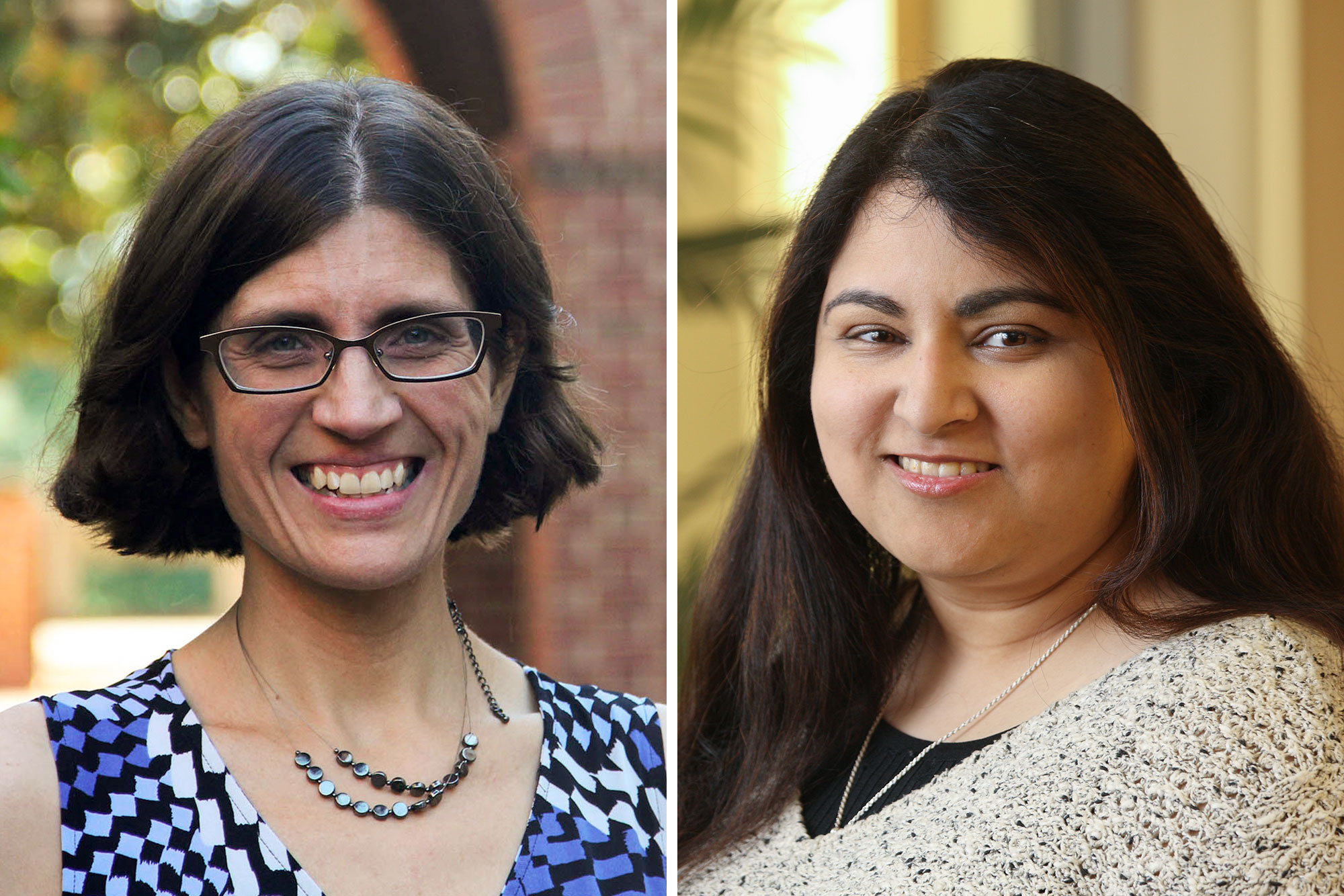
April Salerno teaches in the School of Education and Human Development’s online Master of Education-Curriculum & Instruction degree for working educational professionals. As an assistant professor in the Department of Curriculum, Instruction and Special Education, she teaches high-quality online, asynchronous classes focused on how to instruct students whose first language is not English.
“Online instruction for me is a passion because I view it as a pathway to open access and to educational equity,” Salerno wrote in her teaching statement.
A departmental colleague wrote in a nomination letter that others in the education school sought out Salerno for her expertise.
“In the pandemic-induced shift to online teaching, many of us sought models for developing and delivering exemplary rigorous and relevant instruction that engages students. Quite fortunately, I have found such a model in my colleague, April Salerno, who I had the pleasure of observing this past fall. Well-versed in online teaching, Salerno skillfully crafts clear and organized courses that empower learners to engage with the content and one another in meaningful ways that foster professional growth.”
“My life’s work is to improve learning opportunities for linguistically diverse children and youth,” Salerno said, “so I do everything I possibly can to model for my students what it means to provide quality, inclusive instruction.”
That also includes designing original simulations of teachers and immigrant families, for example.
In the beginning of the semester, she teaches one session speaking only Romanian – to let her teaching students know what it feels like for someone learning a new language. That gives them “the opportunity to empathize and understand,” she said.
Media Contacts
University News Associate Office of University Communications
anneb@virginia.edu (434) 924-6861







